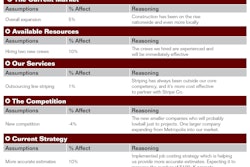
To be a lean financial contractor is to manage your finances with priorities, discipline and commitment. Greater accountability in managing the financial side of construction is most directed at owners and senior leaders, but financial accountability should also be found among even the front line leaders, and even with the laborers. We’ll take this very important topic in two parts. First, in this article, we’ll address the accountability directed at the contractor, the owner.
Philosophy of financial management
Most approaches by owners begin with their philosophy. How a contractor approaches sales, operations, leadership and even finances is based on his or her philosophy. This is what makes one contractor slightly different from another contractor, even in the same specialty of trade. Therefore, it is very important that the contractor is aware of the philosophy in play and what results can be realized.
A philosophy of financial management might be realized in several ways, including:
- Always pay cash when purchasing equipment
- Seek to maintain 30% to 40% cash in reserves
- Keep use of credit cards to only owner and “approved” senior leaders
- If credit cards are used, maintain a financial cap on what can be charged
- Separate company purchases from personal purchases
While some of the above are also tactics, they do represent general philosophies that contractors often hold. Now, what is the right financial management philosophy to embrace? There’s no one answer to this question, but let me present a statement of practice that I’ve observed exist among the more successful contractor:
To position our financial state so that priorities for expenditures are executed; wasteful, personal and nonbusiness-related monies are kept to a minimum, if not eliminated.
The key word in the entire philosophical statement is priorities. Why? Because without thoughtful and clear priorities, a contractor can spend himself (or herself) into overdrawn bank accounts, unpaid bills to vendors and bankruptcy. Unfortunately this happens all too often. Don’t believe me? Just check on the number of contractors who go out of business annually.
If priorities are so important to a more “thinking lean” approach to financial management, what are some safe principles to apply that can keep a contractor from falling into the very negative abyss of financial mismanagement?
Let me share four principles to strengthen your financial philosophy to be lean yet flexible to address your company’s growing needs.
Lean financial principles
#1 Develop your budget…and manage it
The first differentiator for a contractor who is growing is the development of a financial budget. This is a great effort to make, but there are still a host of contractors who have budgets but who still fall into financial problems. Why? In many cases the contractors' financial woes stem from their not managing what they budgeted.
The contractor must manage his budget. This requires a weekly review of budgets, noticing trends in expenditures, receivables and how individual departments are staying close to budget forecasts. There is no magic here, just hard and consistent work at realizing where the dollars are coming in and going out against what was anticipated with the budget.
Now, can budgets be wrong? Sure, but the wrongness of a budget may be easily adjusted. Plus, if the budget appears to be off from what the needs are, then the contractor, the financial controller and senior leaders need to camp out on what is actually happening and learn why the real numbers are too high or low. Solving this problem will more than likely solve the issue.
But the key principle here is to develop a budget…and then manage to it.
#2 Discipline yourself on what you will NOT spend
This second principle might be the most difficult to execute for some contractors. Why? Well, some contractors just can’t help but buy that new shiny piece of equipment or upgrade their vehicles every new year to the more expensive model.
Likewise, some contractors are tempted to spend their money on worthwhile efforts, such as civic and community needs. While giving to charities is honorable, and certainly important to do, many contractors often will give away large amounts of cash to such groups, severely crippling their own cash flow for needs within their own business.
I have found that many successful contractors, while supporting local nonprofit groups, are more acutely aware of what they will NOT spend company money on and have determined a priority, each year, to whom they will be making contributions.
This allows the contractor to then politely inform new requests with, “I’m sorry, we’ve already prioritized who we will be supporting this year.” Tough to do for some contractors but needed none the less.
A personal observation about some contractors who are not disciplined about their expenditures: The lack of self-restraint on spending often leads a contractor to purchase the “toys.” This can represent the “company” boat, jet skis, snow mobiles, customized RVs, etc.
Look, I like toys as much as the next owner, but contractors must be aware of the financial impact of such toys on their company financials.
A side note to this very real experience is the mental picture often implanted in the heads of workers. Seeing the owner buy playthings, sometimes even parking such toys on the company grounds, sends a very troubling message to the worker of the “haves and have nots.” Be careful what toys you purchase and where you keep such playthings stored.
#3 Set “warning” signs for better financial management
It’s important for a contractor to empower his controller or bookkeeper to warn him whenever the finances are running in the wrong direction. Sometimes this is difficult to do, especially if the financial person in the company is not a spouse or closely related family member. The contractor must remind the person responsible for seeing the numbers first and most often to alert him to trends leading away from the desired results.
Warning signs could include:
- Cash flow amounts approaching the lower acceptable levels
- Purchases made outside of budgeted limits by department or field leaders
- Upcoming notes that must be paid or risk penalties
- Costs of needed parts, materials or services rising beyond past figures
- Poor purchasing decisions that failed to leverage quantity discounts
It is important that each contractor work closely with his financial person to identify the warning signs pertinent to his company. Having the warning signs pre-determined relieves pressure on the controller and assures the contractor that he will be better informed in advance, providing him with more time and options.
#4 Problem-solve wasteful spending and emergency spending
It’s amazing to me when I continue to see contractors who will pay for the same materials, parts or services after not receiving what they should have the first time. For example, a concrete contractor might receive some less-than-acceptable concrete material, or perhaps receive the concrete late — and yet still use it and then order materials from the same material plant.
Often the job leader (foreman, superintendent, or PM) might be making that decision, and do so, because he’s got to get the job completed and closed out. Yet, this has future problems written all over it.
Problem-solving requires the contractor, and those associated with a problem purchase, to think through root causes and work to prevent such causes from appearing again. If, in the example just provided, material plants are few and far between, then the contractor might have to go have a serious discussion with the plant’s owner or leader to address the issues.
There’s nothing easy about this, but I have found that receiving less-than-quality products, parts and services can cost contractors time and money — more than they anticipated.
Emergency spending is most often related to poor planning, poor organization and poor preparation. From not providing all the needed information to a work crew about a project to not having an organized and prioritized yard and storeroom, the need to make emergency spending decisions will continue to exist.
But emergency spending is most often more expensive. So, rather than having the crew leave for a job with all of the equipment and tools needed to complete the project, they must buy or lease the items that should have been on the truck to begin with, adding to the direct costs that had been projected.
Emergency spending, while sometimes needed, seldom helps the profitability picture for the contractor. Worse yet, is the lack of discipline among leaders who will begin to plan less, communicate less, organize less, prepare less, etc., leading to even more emergency spending.
Consider the following brief last thoughts for your lean thinking:
- STOP using your company as your private “pleasure fulfillment” resource
- Keep long-term success ahead of short-term expenditures
- Be “tight” with your money…without being “Mr. Scrooge”
- Remember, “He who as the most toys does NOT win”
- Debt is such a bad thing to own
- Think and drive cost containment!
- Reward cost reduction ideas and fulfillment
- It’s never too late to think “surplus”
Make being a lean financial management-focused contractor a reality. Position yourself with smart, lean-committed leaders who are not foolish about money. Set your personal “wants” aside, not forgetting them but realizing that putting your company into debt situations will erase your pleasure fulfillment resource anyway.
Here’s to accountable financial management. It starts with you!



















